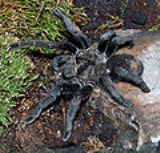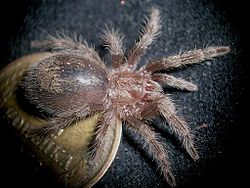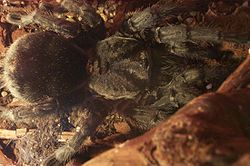
Grammostola pulchra
Encyclopedia
Grammostola pulchra is a terrestrial tarantula
native to Brazil
. The species is desirable in the pet trade because of their females, long life and reputation for being docile and gentle in temperament, as well as for its appealing dark coloration. These traits make them rather expensive when buying from a breeder. Commonly known as the Brazilian black, mature specimens are almost entirely black. Although like most new world tarantulas it possesses urticating hairs. It is said to have a reduced tendency to kick them off when handled, which adds to its desirability as a pet. Many times, they do not spread urticating hairs around their homes, as observed in other tarantula species. If provoked, they would much rather flee than attack. Their venom is not as irritating as many other species of tarantulas. The Brazilian Black is a slow grower, taking up to eight years to reach maturity, reaching up to 7 inches. Because of a ban on the export of wild caught specimens and its slow growth, mature females (preferred because of their long life) are generally expensive. As with all tarantulas, females of this species will almost always outlive males by many years. As a juvenile in captivity, this species tends to burrow when given the opportunity, but it is not detrimental to their health if they cannot. Dry substrate is key to keeping this species comfortable. Most members of this species are hearty eaters in comparison to other members of the Grammostola genus. They thrive off of mealworms, crickets, roaches, and other small insects.


Tarantula
Tarantulas comprise a group of often hairy and often very large arachnids belonging to the family Theraphosidae, of which approximately 900 species have been identified. Some members of the same Suborder may also be called "tarantulas" in the common parlance. This article will restrict itself to...
native to Brazil
Brazil
Brazil , officially the Federative Republic of Brazil , is the largest country in South America. It is the world's fifth largest country, both by geographical area and by population with over 192 million people...
. The species is desirable in the pet trade because of their females, long life and reputation for being docile and gentle in temperament, as well as for its appealing dark coloration. These traits make them rather expensive when buying from a breeder. Commonly known as the Brazilian black, mature specimens are almost entirely black. Although like most new world tarantulas it possesses urticating hairs. It is said to have a reduced tendency to kick them off when handled, which adds to its desirability as a pet. Many times, they do not spread urticating hairs around their homes, as observed in other tarantula species. If provoked, they would much rather flee than attack. Their venom is not as irritating as many other species of tarantulas. The Brazilian Black is a slow grower, taking up to eight years to reach maturity, reaching up to 7 inches. Because of a ban on the export of wild caught specimens and its slow growth, mature females (preferred because of their long life) are generally expensive. As with all tarantulas, females of this species will almost always outlive males by many years. As a juvenile in captivity, this species tends to burrow when given the opportunity, but it is not detrimental to their health if they cannot. Dry substrate is key to keeping this species comfortable. Most members of this species are hearty eaters in comparison to other members of the Grammostola genus. They thrive off of mealworms, crickets, roaches, and other small insects.
Photos



